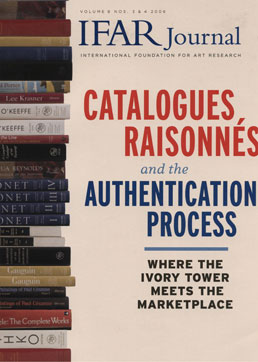IFAR Journal Special Issues
Volume 8, No. 3/4
2006
Preface to edited proceedings of IFAR conference (Dec. 14-15, 2001), “Catalogues Raisonnés and the Authentication Process – Where the Ivory Tower Meets the Marketplace.”
— Sharon Flescher
Introduces the scope and objectives of the conference and IFAR’s history with catalogues raisonnés
Introduction: Right or Wrong, Real or Fake: Who Cares?
— Samuel Sachs II
Sachs discusses the challenges, vagaries, varieties and origins of catalogues raisonnés.
Procedures and Process Panel: Introduction
— Nancy Mowll Mathews
Mathews, President of the Catalogue Raisonné Scholars Association, introduces the five speakers for the session dealing with methodology of producing a catalogue raisonné.
Methods of Research: Case Studies from the Warhol Catalogue Raisonné
— Neil Printz
Printz, co-editor of the recent Warhol catalogue, gives examples of the meticulous research involved in dating and cataloging Warhol’s works.
Establishing Reliable Evidence
— Sarah Faunce
Faunce, director of the Courbet Catalogue Raisonné project, discusses the evidentiary procedures that underlie the catalogue raisonné process.
The Kandinsky Catalogue Raisonné
— Vivian Endicott Barnett
Barnett, author of catalogues on Kandinsky’s drawings and watercolors, discusses the challenges intrinsic to Kandinsky and argues for involving a committee rather than an individual in the process.
Partnerships Between Conservators and Art Historians in the Creation of Catalogues Raisonnés
— Joyce Hill Stoner
Stoner, a conservator, demonstrates the advantages of involving a conservator in the catalogue process.
Who Judges the Experts? Panel: Introduction
— Grace H. Glueck
Glueck, art critic for the New York Times, introduces the three speakers and the issues behind the second conference session: “Who Judges the Experts?”
Experts: Judging the Experts
— Peter C. Sutton
Sutton discusses connoisseurship and compares the decisions and scholarship of several Old Master specialists, particularly those involving Rembrandt.
Experts: The View from the Auction House
— John L. Tancock
Tancock, a specialist in Impressionist paintings at Sotheby’s, discusses the decisions auction houses make regarding authenticity and the particular challenges in dealing with Modigliani, Rousseau and Van Gogh, among other artists.
Experts: Droit Moral and Authentication of Works in France
— Van Kirk Reeves
Reeves, an attorney in Paris, discusses the French concept of the droit moral—moral rights, and the way French courts deal with authenticity.
Getting Published—At What Cost? Panel: Introduction
— Nancy Mowll Mathews
Mathews introduces the third panel—dealing with the challenges of publishing a catalogue raisonné.
Getting Published: The Publishers’ Viewpoint
— Elaine Stainton and Paul Anbinder
Stainton and Anbinder, both publishers, discuss the economics of publishing catalogues raisonnés.
Getting Published: The Role of the Artists Rights Society
— Theodore H. Feder
Feder discusses copyright issues as they pertain to publishing catalogues raisonnés and other books.
Legal Liability for Giving Opinions. Panel: Introduction
— Theodore N. Kaplan
Kaplan, an attorney, introduces the three attorneys and one insurance specialist on the panel.
Legal Liability: Defamation, Disparagement and Malpractice
— Steven Mark Levy
Levy discusses the risks art experts face when giving opinions on authenticity and ways to protect themselves.
Legal Liability: Are Opinions Dangerous Things to Give? Suits Against the Pollock-Krasner Authentication Board
— Ronald D. Spencer
Spencer, attorney for the Pollock-Krasner Foundation, discusses three failed lawsuits against that Foundation.
Legal Liability: Insulating Yourself from Liability
— Peter R. Stern
Stern offers practical advice to art specialists about protecting themselves from lawsuits
Legal Liability: Insurance for Art Scholars and Writers
— Ellen Hoener Ross
Ross discusses the types of Errors and Omissions (professional liability) insurance coverage.
Ethics & Potential Conflicts of Interest Panel: Sponsorship and the Inevitability of Conflicts
— Jack Cowart
Cowart, President of the Lichtenstein Foundation, introduces the variety of potential conflicts of interest that authors of catalogues raisonnés face.
Ethics: A Museum Curator’s Perspective
— Arthur K. Wheelock, Jr.
Wheelock, a curator at the National Gallery of Art, discusses the subtle and shifting issues of authenticity faced by museum curators—particularly in the Old Masters field.
Ethics: Georgia O’Keeffe Catalogue Raisonné and the CAA’s Code of Ethics for Art Historians
— Barbara Buhler Lynes
Lynes discusses the College Art Association’s Code of Ethics for art historians as well as ethical issues she faced when preparing the catalogue raisonné on Georgia O’Keeffe.
Post-Research: Dealing With the Field Panel: IFAR’s Catalogue Raisonné Survey
— Sharon Flescher
Flescher summarizes some of the results of IFAR’s statistical survey of catalogue raisonné authors, the first quantifiable study of the methodology and risks of producing a catalogue. She also introduces the panelists on the last panel.
Post-Research: A Scholar’s Perspective: The Edward Hopper Catalogue Raisonné
— Gail Levin
Levin addresses the challenges she has faced since publishing the catalogue on Edward Hopper.
Post-Research: The Needs of the Marketplace
— Michael Findlay
Findlay, a former auction specialist and now a dealer, discusses the interaction and interdependency of the marketplace and art experts.

